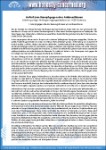
Aufruf zum Kampf gegen Antisemitismus – Erklärung einiger NGO’s zur OSZE Konferenz 2004
The continuing resurgence of anti-Semitism in the OSCE region has prompted a High-Level Commemorative Event marking the 10th Anniversary of the OSCE’s Berlin Conference on Anti-Semitism, recalling the 2004 Berlin high-level conference, to renew government commitments to fighting anti-Semitism.
These government efforts are augmented and strengthened by the participation of civil society groups. At a Civil Society Forum on Anti-Semitism in Berlin on Nov. 12, 2014, the following recommendations to the OSCE for intensifying the fight against anti-Semitism were passed. In particular, we call on OSCE Participating States to:
..
..
..
- Recall the 2004 Berlin Declaration that “declared unambiguously that international developments or political issues, including those in Israel or in the Middle East, never justify anti-Semitism.”
.. - Use the EUMC Working Definition on Anti-Semitism when monitoring and recording acts of anti-Semitism.
.. - Institute teacher training and educational programs at all levels to combat anti-Semitism, focusing in particular on the growing dissemination of anti-Semitism in social media as well as on growing societal diversity.
.. - Comply with commitments on monitoring and prosecuting anti-Semitic hate crimes, in partnership with civil society, disclosing detailed statistical information on the nature of the incidents, publicizing the data and sharing it with ODIHR.
.. - Designate a commissioner or coordinating body to ensure comprehensive cooperation on monitoring, prosecution, public awareness and education against anti-Semitism.
.. - Issue an annual report on anti-Semitic incidents and on government efforts to combat anti-Semitism.
.. - Promote cooperation of all European agencies concerned with combating anti-Semitism, eliminating competing roles and enhancing strategic and practical cooperation amongst them.
.. - Review and enforce legislation countering anti-Semitism.
.. - Convene annual summit meetings amongst government officials, justice and law enforcement agencies, Jewish communities, and other community stakeholders.
.. - Improve security for Jewish institutions by ensuring adequate police protection, training police and law enforcement to identify anti-Semitic hate crimes, funding security measures for Jewish institutions, and engaging Jewish leadership to encourage higher levels of reporting.
.. - Promote media literacy and anti-hate counter-speech and provide financial support for civil society initiatives that promote programs and methods to curb online anti-Semitism and Holocaust denial.
.. - Condemn all expressions of Holocaust denial and efforts to distort its meaning, with reference to the International Holocaust Remembrance Alliance (IHRA) “Working Definition of Holocaust Denial and Distortion.”
.. - Strengthen assistance for civil society and intercommunal networks to speak out against anti-Semitism and all forms of racism, independent of their differing views on the Middle East conflict, to provide support in times of crisis.
.. - Recognize and protect the rights of Jews to their religious practices.
- Refrain from using or instrumentalizing anti-Semitic stereotypes blaming political actors or other governments.
.. - Denounce and investigate anti-Semitic comments and incidents made by ultra-nationalist Groups.
.. - Reject trivialization of the Holocaust through historical revisionism that equates totalitarian regimes without historical distinctions.
.. - Support efforts of civil society networks to combat anti-Semitism and other forms of intolerance, establishing task forces or working groups in which law enforcement authorities and governmental stakeholders may participate.
.. - Wherever possible secure endorsement for these recommendations through appropriate PC and Ministerial Council decisions.
Hier noch die Forderungskataloge und Empfehlungen von Nichtregierungsorganisationen (NGO’s) an die OSZE Mitgliedsstaaten, wie sie auf der 2015 10-year Anniversary Konferenz in Berlin verteilt wurden:

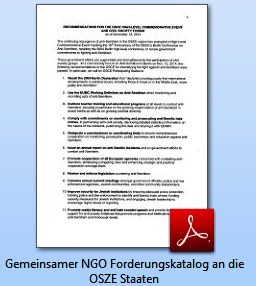
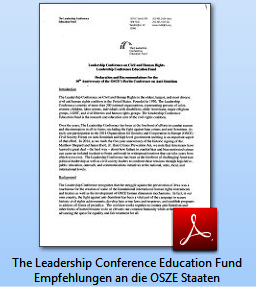
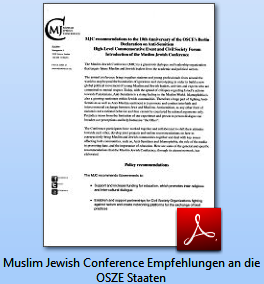
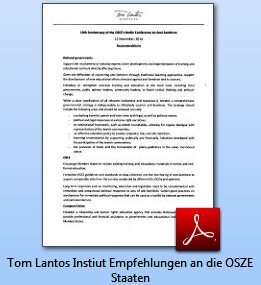


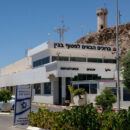
Sacha Stawski
Tatsächlich wurde das Thema in der Arbeitsgruppe in der auch in sprach sehr wohl thematisiert – nicht zuletzt von mir…
http://elderofziyon.blogspot.de/2014/11/conference-on-antisemitism-in-berlin.html#.VGkPAKkwd01